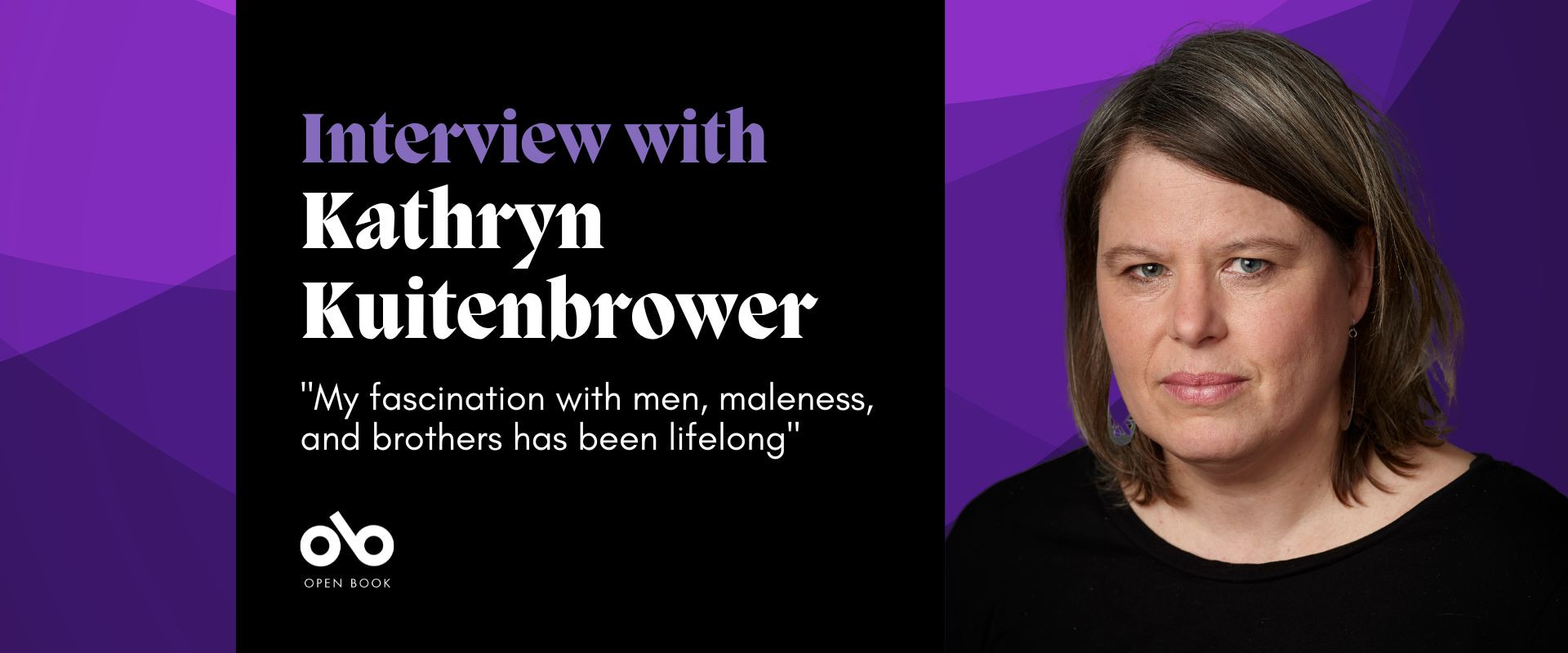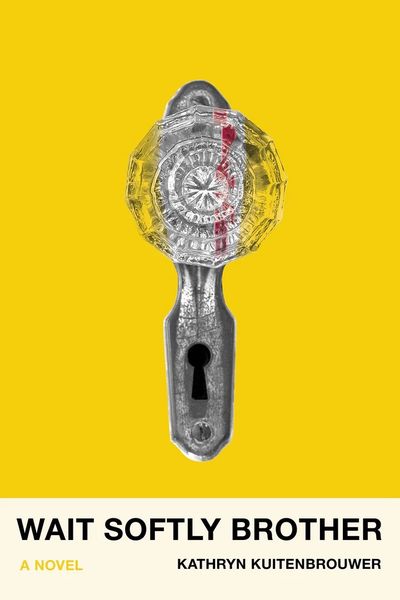"It is For and Of Him, All of It" Kathryn Kuitenbrouwer on Writing Her Stunning, Autobiographical New Novel
All families have stories. Whether funny, strange, or sad, the stories we tell about ourselves and to each other—or refuse to tell—irrevocably shape our families.
In acclaimed author Kathryn Kuitenbrouwer's new novel, Wait Softly Brother (Wolsak & Wynn), a woman, also named Kathryn, walks out of a 20-year marriage and heads back to her childhood home. Her plan is to hole up and write the story that has haunted her all her life: one about her stillborn brother, Wulf. But her parents, bustling and practical in the face of Kathryn's untethered state, insist on her help with cataloguing old letters and mementos.
In those she finds an even stranger family story, featuring a long lost ancestor fighting in the American Civil War. As Kathryn sinks into the thought records of the generations that came before her, a steady, pouring rain cuts the house off, seemingly, surreally, from civilization. As the days go on, and the past and present blur and the waters rise, Kathryn's stories—of her brother, her ancestor, and her own loss—come together in haunting and powerful ways.
A gorgeous book that examines storytelling at its core, as well as family, memory, and identity, Wait Softly Brother is Kuitenbrouwer's first novel in almost ten years (after her critically acclaimed All the Broken Things in 2014), and the wait has very much been worth it. We're speaking with her about the book today for our Long Story interview series for novelists.
She tells us about how the first pages of Wait Softly Brother were written "in public", with the feedback she received in those early days affecting the course of the novel, reveals how Wulf was inspired by her own brother whose early passing "has haunted [her] entire life", and shares the perfectly suited Al Purdy poem from which she drew the novel's title.
Open Book:
Do you remember how you first started this novel or the very first bit of writing you did for it?
Kathryn Kuitenbrouwer:
I first started writing Wait Softly Brother on a website called Red Lemonade. This site, begun by the American publishing impresario, Richard Nash, as a gateway to his then publishing venture Cursor, was in beta testing in 2012 as a social media platform that connected writers, fans, and editors. The community commented on work uploaded to the site and so writers got more or less simultaneous editorial feedback. I wrote the first pages of this novel in public, in other words. I wrote automatically just to see what would arise. I was in the process of developing for myself a way of writing that was unpremeditated and that trusted the material as it emerged. It was a risk to write in public but that risk felt necessary to me at the time. That a Civil War autofiction emerged in this way was a symptom rising, as my own marriage fell apart within four or five years of the project’s beginnings.
OB:
How did you choose the setting of your novel? What connection, if any, did you have to the setting when you began writing?
KK:
It really felt to me at the time as if the story was choosing me. I began writing and this battle scene burst out of me. In the beginning, I had no connection to the terrain of the novel—Virginia and Washington and New York State—but soon enough, I found myself at Yaddo in New York and the Virginia Centre for the Creative Arts (VCCA) in Virginia for weeks long writing residencies and these environments became more familiar to me. The bulk of the Civil War sections were researched and drafted at Yaddo and VCCA, time stolen out of a busy family and work life, for which I am grateful. The frame story—the story of me leaving my family and the city in the midst of a terrible rainy season—is set in a settler stone farmhouse, on a 100 acre property that I sold just after finishing the novel. In some way Wait Softly Brother is an homage to that landscape, to the lonesome country north of Belleville, where I lived for five years after my divorce. To be fair, the frame story is an amalgam of that landscape and the landscape of my childhood home outside of Ottawa, a farm dense with cedar trees and formed as an ancient sea receded. It was magical to find shells and fossils in the forest when I was small. My parents were in a lengthy process of moving from that home during the writing of this novel. At one point I went there and walked the property and let it remind me of moments in my childhood, many of which have become scenes in the novel. Place and objects are evocative for me and the novel is a testament to this, I hope. I am ever intrigued by the way that we are entwined in the stories of our lives, how we embed ourselves into bric-a-brac and space, and come to know ourselves as if we are plotted, as if we have a narrative trajectory, through our landscapes and through the objects we collect in our lifetimes. And then we die, and all that’s left is the stuff we handled, things that meant something to us (but why?), and the territory on which the dramas of our lives played out. This to me is simultaneously mundane and epic material. It might be all we have to work with, really.
OB:
If you had to describe your book in one sentence, what would you say?
Your CanLit News
Subscribe to Open Book’s newsletter to get local book events, literary content, writing tips, and more in your inbox
KK:
Wait Softly Brother is an autobiographical fiction about how, as languaged creatures, we crave narration.
OB:
Who did you dedicate your novel to, and why?
KK:
Wait Softly Brother is dedicated to my brother. The novel’s opening set of problems arises from the narrator’s desire to find out more about her stillborn brother, Wulf. The narrator is me. Before I was born, my mother gave birth to a stillborn son, who was named and baptized and buried. My mother never saw him nor went to the gravesite. This brother has haunted my entire life. I understand him as an analog for my own boyishness, my own bisexuality, my own ability and yearning to code-switch from feminine to masculine aspects of myself. I had begun to see the ways in which this haunting came out in my writing, how male characters arose in my fiction and came to tragic ends. I seemed to subconsciously be narrating a life for this brother, a brother who had become introjected for me, as an internal aspect that needed a story, that was fighting for space on the page. When I noticed this, I decided that I wanted to aim at the symptom. And so the novel as it came together became a way for me to query this loss, a strange loss indeed since I never met him, of course, and he died before he had a chance at story, long before I was born. My fascination with men, maleness, and brothers has been lifelong and doesn’t seem to let up. I am constantly on the lookout for my brother in real life and in literature. How can I animate him? Where does he reside? In Wait Softy Brother he is animated as a naïve, unhinged medical student from Toronto, Russell Boyt, who escapes his oppressive, middle class family by becoming a substitute soldier in the American Civil War. Russell, unsuited and unprepared for battle, is in for the story of his life. My brother is also replicated in another character, named Charles, who is tragically orphaned and who spends a portion of the novel seeking a family. This boy haunts me in the frame story and I spend time to no avail trying to locate him in various archives. This fabricated man and this imagined boy are the brothers I have conjured by way of compensation. They are imperfect, lost, stupid, full of yearning, and as human as my meagre skills would allow. And so, who else to dedicate my novel to but to my brother, as it is for and of him, all of it.
OB:
Did you include an epigraph in your book? If so, how did you choose it and how does it relate to the narrative?
KK:
There are two epigraphs for Wait Softly Brother. The first is a poem by Al Purdy called “The Dead Poet,” which Howard White at Harbour Publishing graciously let us use in whole. It is from this poem that I pulled my title. The book had a completely other title, one referencing substitute soldiering, a detail in the novel that works on the level of metaphor (since the plot banks on things meaning other things and people standing in for other people. In other words, it is about the way in which meaning shifts around). But that other title was taken by the time of publication and so I was searching in Purdy’s work for a new title. Purdy seemed the right avenue since the novel is set in his old stomping grounds, in and around Trenton, Ontario. The first stanza of that poem is:
I was altered in the placenta
by the dead brother before me
who built a place in the womb
knowing I was coming:
he wrote words on the walls of flesh
painting a woman inside a woman
whispering a faint lullaby
that sings in my blind heart still
I think it must be obvious why this would have to be the epigraph for Wait Softly Brother.
The second epigraph is a short pull quote from Dodie Smith’s I Capture the Castle, a novel about writing just as much as it about love and family. The quote is: “Perhaps if I make myself write, I shall find out what is wrong with me.” I wouldn’t have gravitated to this line or to writing this book if I didn’t ascribe to the therapeutic power of writing. I think, though, that I found out what is right with me through the writing of Wait Softly Brother.
_________________________________________________
Kathryn Kuitenbrouwer is the bestselling author of the novels All the Broken Things, Perfecting, and The Nettle Spinner. She is also the author of the story collection, Way Up. Her work has appeared in Granta, The Walrus, Maclean’s, The Lifted Brow, Significant Objects, Storyville and others. Kathryn teaches literature and creative writing at the University of Toronto.






